Examining the Functions and Roles in Health and Social Care
VerifiedAdded on 2023/06/10
|8
|2671
|424
Report
AI Summary
This report provides a detailed overview of the functions and roles within the health and social care sector. It explores key legislation such as the Equality Act 2010 and discusses health and safety protocols and codes of practice. The report also summarizes essential health and social care values, including duty of care, safeguarding, confidentiality, and a person-centered approach, highlighting their importance in delivering quality care. Furthermore, it examines how individuals accessing these services are valued and outlines different types of services, such as statutory, private, and voluntary. The report also addresses barriers to accessing health and social care, such as communication issues, cultural beliefs, and cost, and suggests strategies to overcome them. Finally, it defines informal care and describes the roles of informal carers, emphasizing their significant contribution to the well-being of patients. The report concludes by reiterating the importance of a comprehensive and patient-focused approach to health and social care.
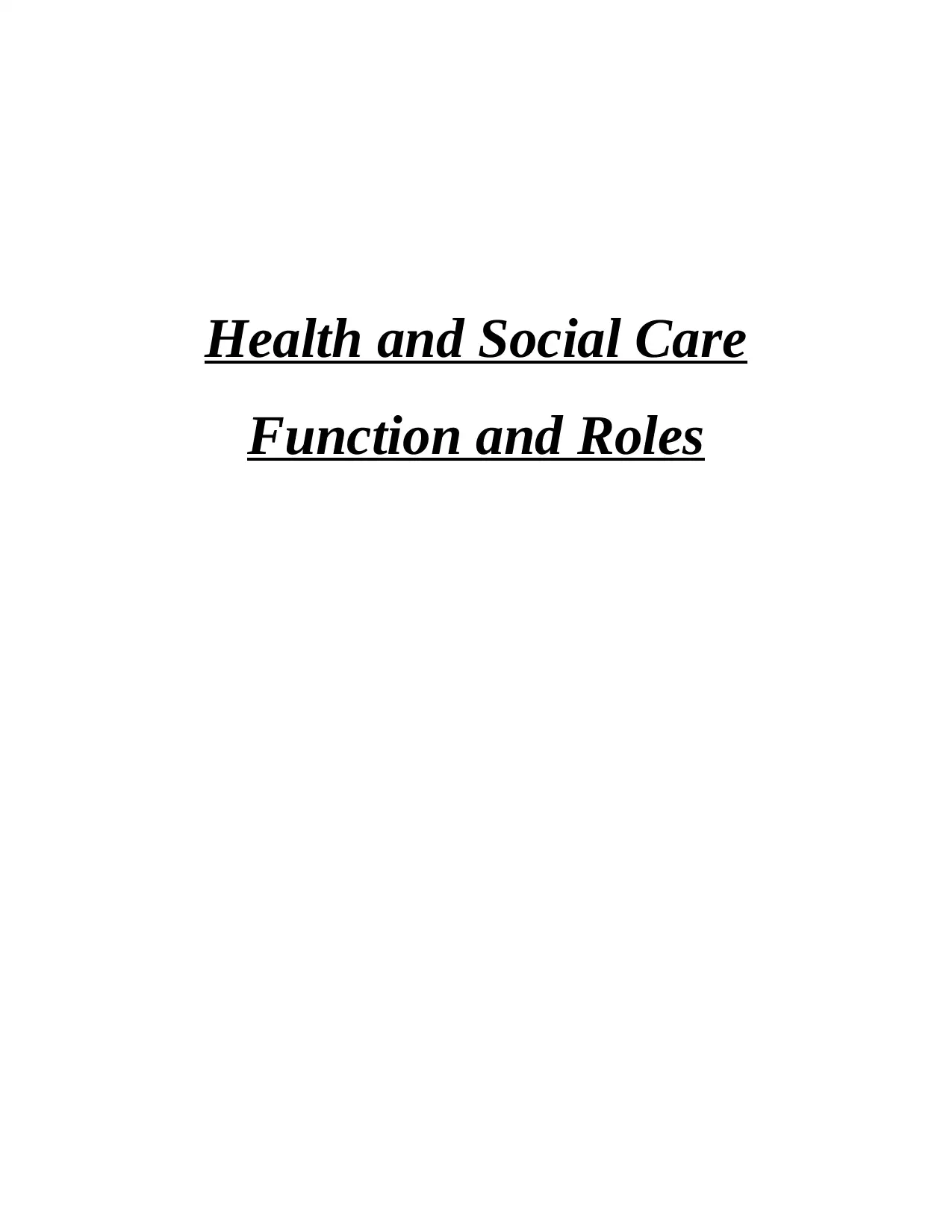
Health and Social Care
Function and Roles
Function and Roles
Paraphrase This Document
Need a fresh take? Get an instant paraphrase of this document with our AI Paraphraser
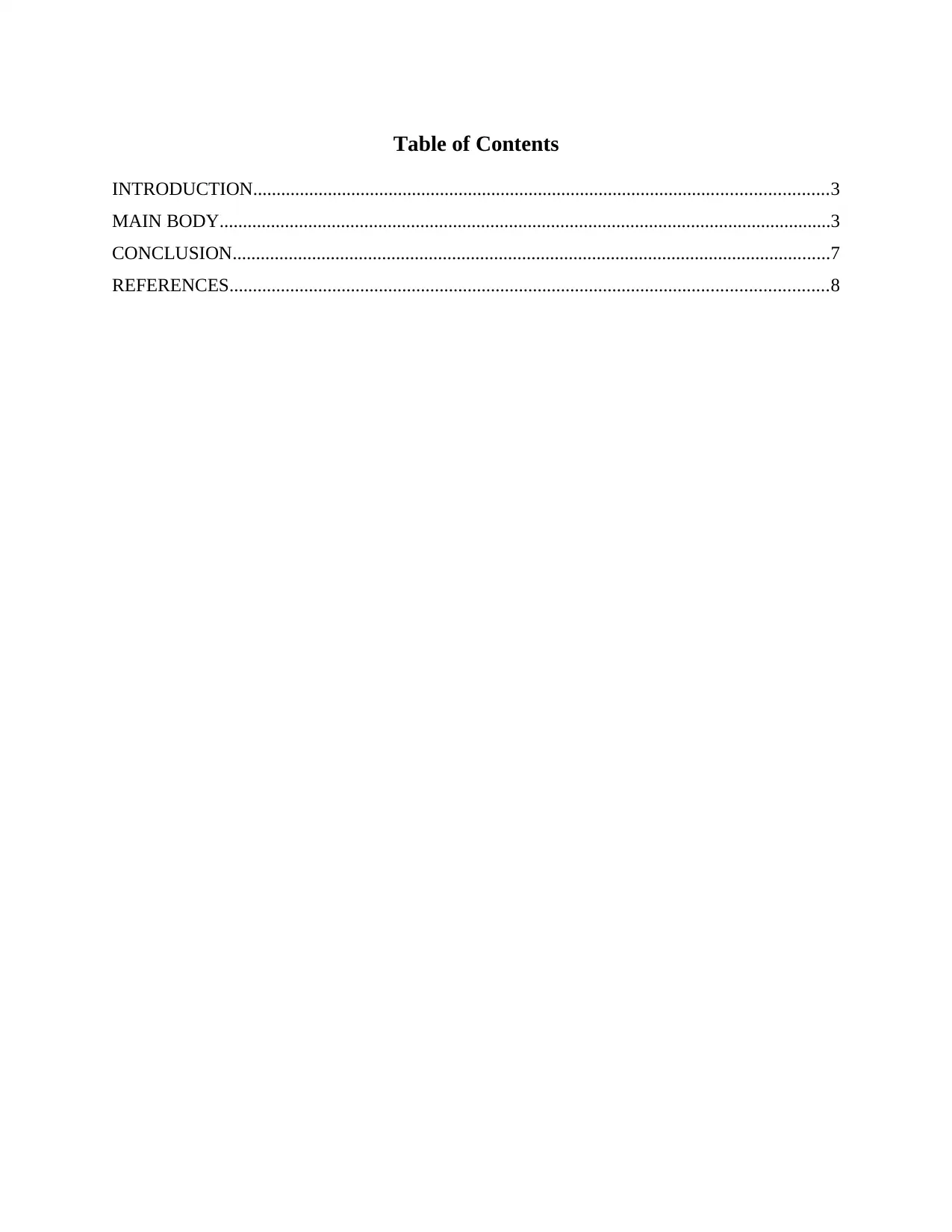
Table of Contents
INTRODUCTION...........................................................................................................................3
MAIN BODY...................................................................................................................................3
CONCLUSION................................................................................................................................7
REFERENCES................................................................................................................................8
INTRODUCTION...........................................................................................................................3
MAIN BODY...................................................................................................................................3
CONCLUSION................................................................................................................................7
REFERENCES................................................................................................................................8
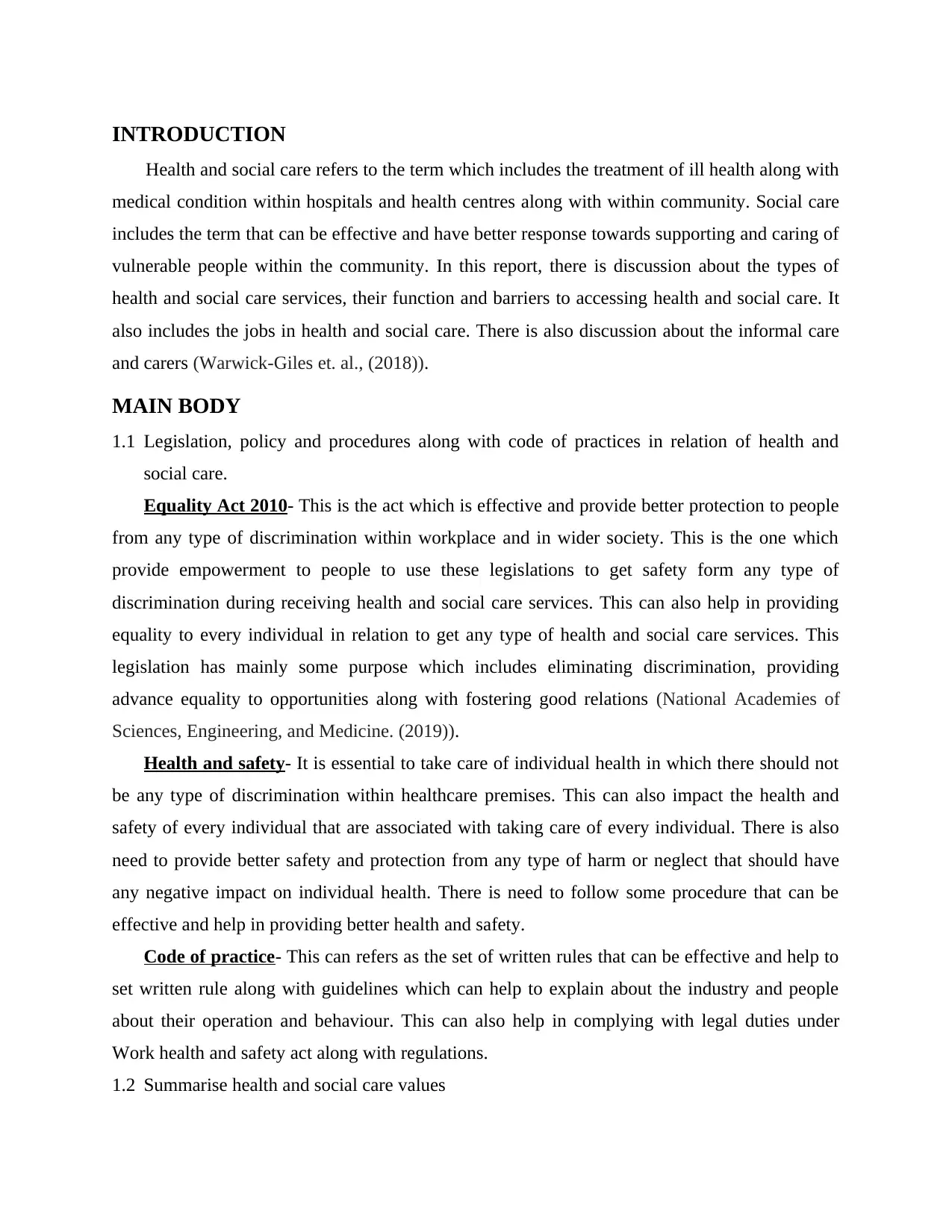
INTRODUCTION
Health and social care refers to the term which includes the treatment of ill health along with
medical condition within hospitals and health centres along with within community. Social care
includes the term that can be effective and have better response towards supporting and caring of
vulnerable people within the community. In this report, there is discussion about the types of
health and social care services, their function and barriers to accessing health and social care. It
also includes the jobs in health and social care. There is also discussion about the informal care
and carers (Warwick-Giles et. al., (2018)).
MAIN BODY
1.1 Legislation, policy and procedures along with code of practices in relation of health and
social care.
Equality Act 2010- This is the act which is effective and provide better protection to people
from any type of discrimination within workplace and in wider society. This is the one which
provide empowerment to people to use these legislations to get safety form any type of
discrimination during receiving health and social care services. This can also help in providing
equality to every individual in relation to get any type of health and social care services. This
legislation has mainly some purpose which includes eliminating discrimination, providing
advance equality to opportunities along with fostering good relations (National Academies of
Sciences, Engineering, and Medicine. (2019)).
Health and safety- It is essential to take care of individual health in which there should not
be any type of discrimination within healthcare premises. This can also impact the health and
safety of every individual that are associated with taking care of every individual. There is also
need to provide better safety and protection from any type of harm or neglect that should have
any negative impact on individual health. There is need to follow some procedure that can be
effective and help in providing better health and safety.
Code of practice- This can refers as the set of written rules that can be effective and help to
set written rule along with guidelines which can help to explain about the industry and people
about their operation and behaviour. This can also help in complying with legal duties under
Work health and safety act along with regulations.
1.2 Summarise health and social care values
Health and social care refers to the term which includes the treatment of ill health along with
medical condition within hospitals and health centres along with within community. Social care
includes the term that can be effective and have better response towards supporting and caring of
vulnerable people within the community. In this report, there is discussion about the types of
health and social care services, their function and barriers to accessing health and social care. It
also includes the jobs in health and social care. There is also discussion about the informal care
and carers (Warwick-Giles et. al., (2018)).
MAIN BODY
1.1 Legislation, policy and procedures along with code of practices in relation of health and
social care.
Equality Act 2010- This is the act which is effective and provide better protection to people
from any type of discrimination within workplace and in wider society. This is the one which
provide empowerment to people to use these legislations to get safety form any type of
discrimination during receiving health and social care services. This can also help in providing
equality to every individual in relation to get any type of health and social care services. This
legislation has mainly some purpose which includes eliminating discrimination, providing
advance equality to opportunities along with fostering good relations (National Academies of
Sciences, Engineering, and Medicine. (2019)).
Health and safety- It is essential to take care of individual health in which there should not
be any type of discrimination within healthcare premises. This can also impact the health and
safety of every individual that are associated with taking care of every individual. There is also
need to provide better safety and protection from any type of harm or neglect that should have
any negative impact on individual health. There is need to follow some procedure that can be
effective and help in providing better health and safety.
Code of practice- This can refers as the set of written rules that can be effective and help to
set written rule along with guidelines which can help to explain about the industry and people
about their operation and behaviour. This can also help in complying with legal duties under
Work health and safety act along with regulations.
1.2 Summarise health and social care values
⊘ This is a preview!⊘
Do you want full access?
Subscribe today to unlock all pages.

Trusted by 1+ million students worldwide
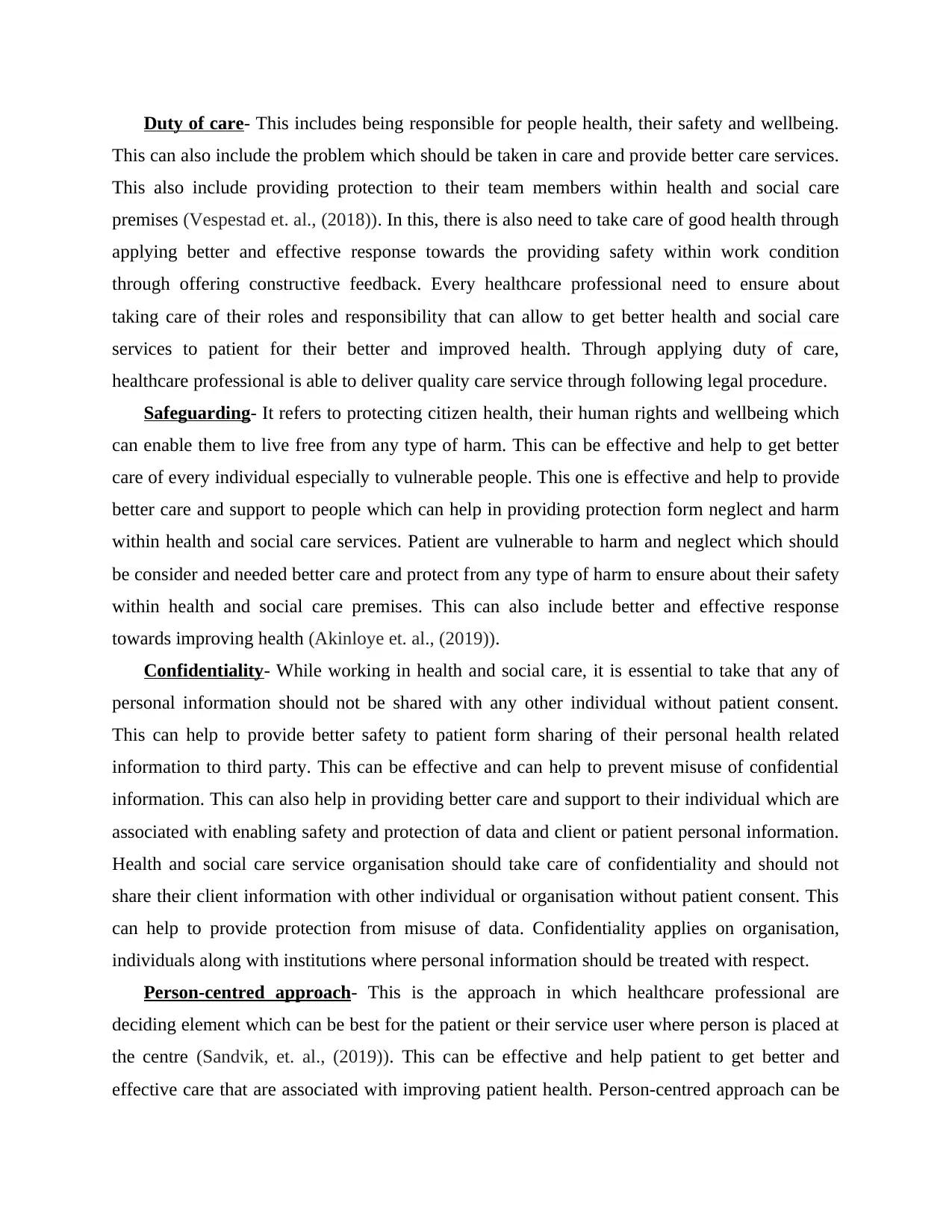
Duty of care- This includes being responsible for people health, their safety and wellbeing.
This can also include the problem which should be taken in care and provide better care services.
This also include providing protection to their team members within health and social care
premises (Vespestad et. al., (2018)). In this, there is also need to take care of good health through
applying better and effective response towards the providing safety within work condition
through offering constructive feedback. Every healthcare professional need to ensure about
taking care of their roles and responsibility that can allow to get better health and social care
services to patient for their better and improved health. Through applying duty of care,
healthcare professional is able to deliver quality care service through following legal procedure.
Safeguarding- It refers to protecting citizen health, their human rights and wellbeing which
can enable them to live free from any type of harm. This can be effective and help to get better
care of every individual especially to vulnerable people. This one is effective and help to provide
better care and support to people which can help in providing protection form neglect and harm
within health and social care services. Patient are vulnerable to harm and neglect which should
be consider and needed better care and protect from any type of harm to ensure about their safety
within health and social care premises. This can also include better and effective response
towards improving health (Akinloye et. al., (2019)).
Confidentiality- While working in health and social care, it is essential to take that any of
personal information should not be shared with any other individual without patient consent.
This can help to provide better safety to patient form sharing of their personal health related
information to third party. This can be effective and can help to prevent misuse of confidential
information. This can also help in providing better care and support to their individual which are
associated with enabling safety and protection of data and client or patient personal information.
Health and social care service organisation should take care of confidentiality and should not
share their client information with other individual or organisation without patient consent. This
can help to provide protection from misuse of data. Confidentiality applies on organisation,
individuals along with institutions where personal information should be treated with respect.
Person-centred approach- This is the approach in which healthcare professional are
deciding element which can be best for the patient or their service user where person is placed at
the centre (Sandvik, et. al., (2019)). This can be effective and help patient to get better and
effective care that are associated with improving patient health. Person-centred approach can be
This can also include the problem which should be taken in care and provide better care services.
This also include providing protection to their team members within health and social care
premises (Vespestad et. al., (2018)). In this, there is also need to take care of good health through
applying better and effective response towards the providing safety within work condition
through offering constructive feedback. Every healthcare professional need to ensure about
taking care of their roles and responsibility that can allow to get better health and social care
services to patient for their better and improved health. Through applying duty of care,
healthcare professional is able to deliver quality care service through following legal procedure.
Safeguarding- It refers to protecting citizen health, their human rights and wellbeing which
can enable them to live free from any type of harm. This can be effective and help to get better
care of every individual especially to vulnerable people. This one is effective and help to provide
better care and support to people which can help in providing protection form neglect and harm
within health and social care services. Patient are vulnerable to harm and neglect which should
be consider and needed better care and protect from any type of harm to ensure about their safety
within health and social care premises. This can also include better and effective response
towards improving health (Akinloye et. al., (2019)).
Confidentiality- While working in health and social care, it is essential to take that any of
personal information should not be shared with any other individual without patient consent.
This can help to provide better safety to patient form sharing of their personal health related
information to third party. This can be effective and can help to prevent misuse of confidential
information. This can also help in providing better care and support to their individual which are
associated with enabling safety and protection of data and client or patient personal information.
Health and social care service organisation should take care of confidentiality and should not
share their client information with other individual or organisation without patient consent. This
can help to provide protection from misuse of data. Confidentiality applies on organisation,
individuals along with institutions where personal information should be treated with respect.
Person-centred approach- This is the approach in which healthcare professional are
deciding element which can be best for the patient or their service user where person is placed at
the centre (Sandvik, et. al., (2019)). This can be effective and help patient to get better and
effective care that are associated with improving patient health. Person-centred approach can be
Paraphrase This Document
Need a fresh take? Get an instant paraphrase of this document with our AI Paraphraser
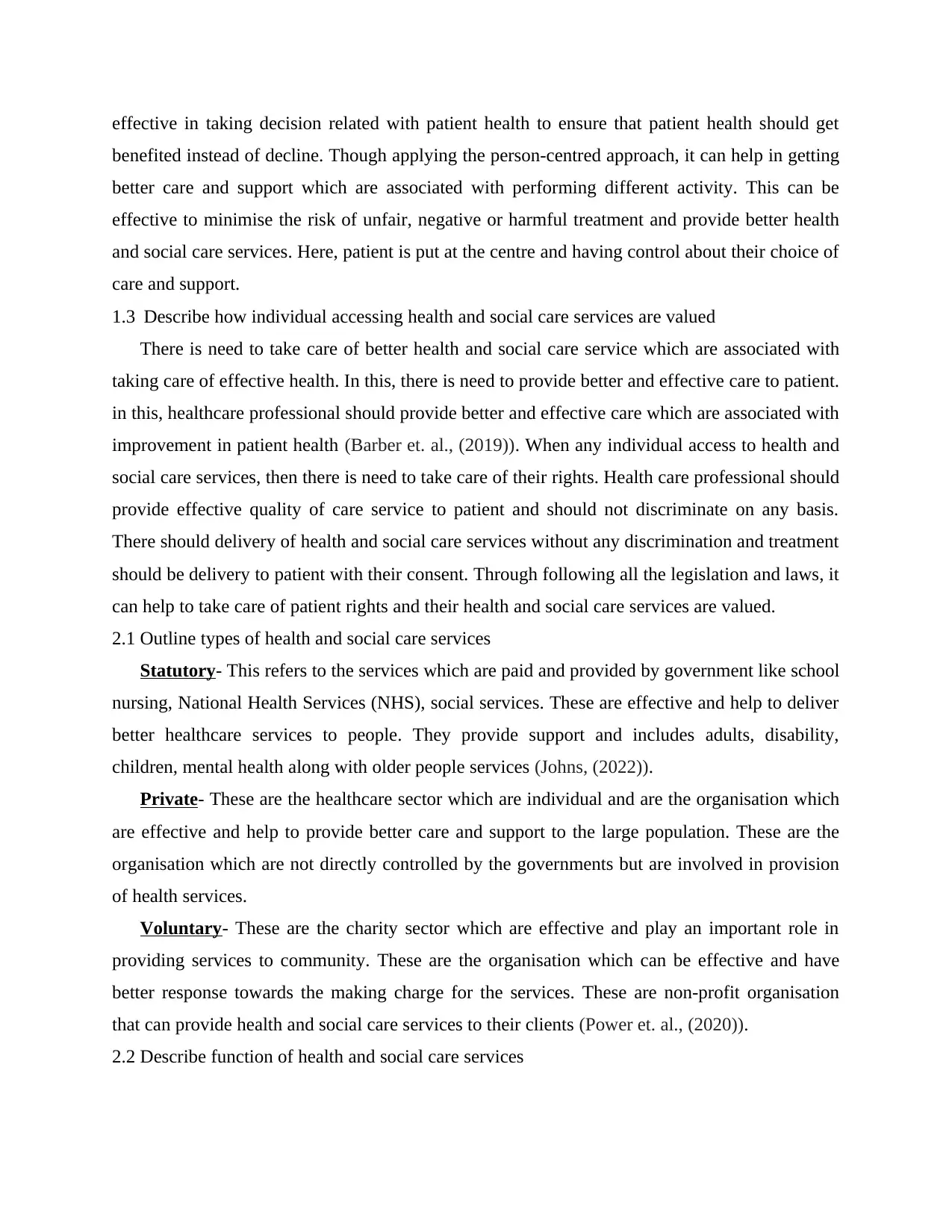
effective in taking decision related with patient health to ensure that patient health should get
benefited instead of decline. Though applying the person-centred approach, it can help in getting
better care and support which are associated with performing different activity. This can be
effective to minimise the risk of unfair, negative or harmful treatment and provide better health
and social care services. Here, patient is put at the centre and having control about their choice of
care and support.
1.3 Describe how individual accessing health and social care services are valued
There is need to take care of better health and social care service which are associated with
taking care of effective health. In this, there is need to provide better and effective care to patient.
in this, healthcare professional should provide better and effective care which are associated with
improvement in patient health (Barber et. al., (2019)). When any individual access to health and
social care services, then there is need to take care of their rights. Health care professional should
provide effective quality of care service to patient and should not discriminate on any basis.
There should delivery of health and social care services without any discrimination and treatment
should be delivery to patient with their consent. Through following all the legislation and laws, it
can help to take care of patient rights and their health and social care services are valued.
2.1 Outline types of health and social care services
Statutory- This refers to the services which are paid and provided by government like school
nursing, National Health Services (NHS), social services. These are effective and help to deliver
better healthcare services to people. They provide support and includes adults, disability,
children, mental health along with older people services (Johns, (2022)).
Private- These are the healthcare sector which are individual and are the organisation which
are effective and help to provide better care and support to the large population. These are the
organisation which are not directly controlled by the governments but are involved in provision
of health services.
Voluntary- These are the charity sector which are effective and play an important role in
providing services to community. These are the organisation which can be effective and have
better response towards the making charge for the services. These are non-profit organisation
that can provide health and social care services to their clients (Power et. al., (2020)).
2.2 Describe function of health and social care services
benefited instead of decline. Though applying the person-centred approach, it can help in getting
better care and support which are associated with performing different activity. This can be
effective to minimise the risk of unfair, negative or harmful treatment and provide better health
and social care services. Here, patient is put at the centre and having control about their choice of
care and support.
1.3 Describe how individual accessing health and social care services are valued
There is need to take care of better health and social care service which are associated with
taking care of effective health. In this, there is need to provide better and effective care to patient.
in this, healthcare professional should provide better and effective care which are associated with
improvement in patient health (Barber et. al., (2019)). When any individual access to health and
social care services, then there is need to take care of their rights. Health care professional should
provide effective quality of care service to patient and should not discriminate on any basis.
There should delivery of health and social care services without any discrimination and treatment
should be delivery to patient with their consent. Through following all the legislation and laws, it
can help to take care of patient rights and their health and social care services are valued.
2.1 Outline types of health and social care services
Statutory- This refers to the services which are paid and provided by government like school
nursing, National Health Services (NHS), social services. These are effective and help to deliver
better healthcare services to people. They provide support and includes adults, disability,
children, mental health along with older people services (Johns, (2022)).
Private- These are the healthcare sector which are individual and are the organisation which
are effective and help to provide better care and support to the large population. These are the
organisation which are not directly controlled by the governments but are involved in provision
of health services.
Voluntary- These are the charity sector which are effective and play an important role in
providing services to community. These are the organisation which can be effective and have
better response towards the making charge for the services. These are non-profit organisation
that can provide health and social care services to their clients (Power et. al., (2020)).
2.2 Describe function of health and social care services
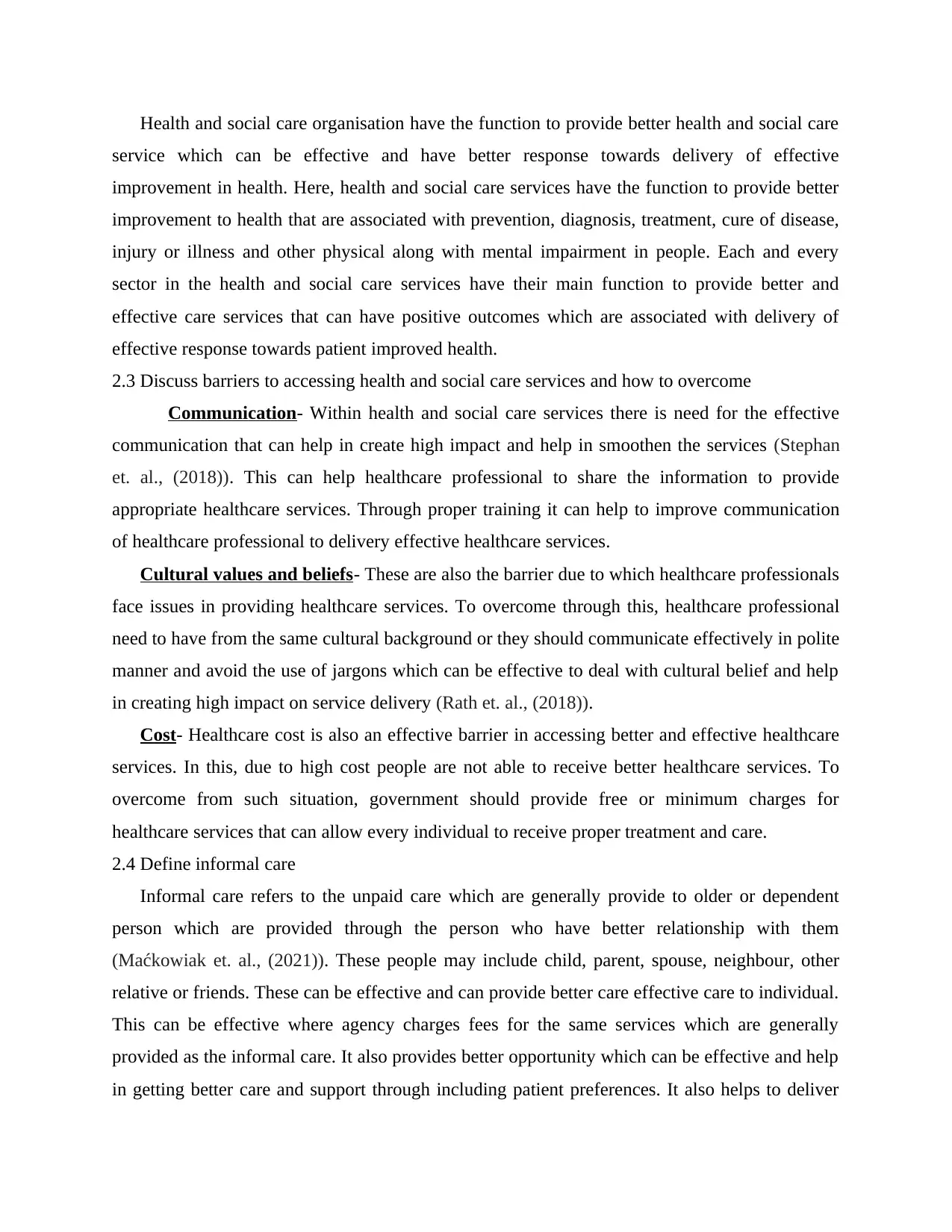
Health and social care organisation have the function to provide better health and social care
service which can be effective and have better response towards delivery of effective
improvement in health. Here, health and social care services have the function to provide better
improvement to health that are associated with prevention, diagnosis, treatment, cure of disease,
injury or illness and other physical along with mental impairment in people. Each and every
sector in the health and social care services have their main function to provide better and
effective care services that can have positive outcomes which are associated with delivery of
effective response towards patient improved health.
2.3 Discuss barriers to accessing health and social care services and how to overcome
Communication- Within health and social care services there is need for the effective
communication that can help in create high impact and help in smoothen the services (Stephan
et. al., (2018)). This can help healthcare professional to share the information to provide
appropriate healthcare services. Through proper training it can help to improve communication
of healthcare professional to delivery effective healthcare services.
Cultural values and beliefs- These are also the barrier due to which healthcare professionals
face issues in providing healthcare services. To overcome through this, healthcare professional
need to have from the same cultural background or they should communicate effectively in polite
manner and avoid the use of jargons which can be effective to deal with cultural belief and help
in creating high impact on service delivery (Rath et. al., (2018)).
Cost- Healthcare cost is also an effective barrier in accessing better and effective healthcare
services. In this, due to high cost people are not able to receive better healthcare services. To
overcome from such situation, government should provide free or minimum charges for
healthcare services that can allow every individual to receive proper treatment and care.
2.4 Define informal care
Informal care refers to the unpaid care which are generally provide to older or dependent
person which are provided through the person who have better relationship with them
(Maćkowiak et. al., (2021)). These people may include child, parent, spouse, neighbour, other
relative or friends. These can be effective and can provide better care effective care to individual.
This can be effective where agency charges fees for the same services which are generally
provided as the informal care. It also provides better opportunity which can be effective and help
in getting better care and support through including patient preferences. It also helps to deliver
service which can be effective and have better response towards delivery of effective
improvement in health. Here, health and social care services have the function to provide better
improvement to health that are associated with prevention, diagnosis, treatment, cure of disease,
injury or illness and other physical along with mental impairment in people. Each and every
sector in the health and social care services have their main function to provide better and
effective care services that can have positive outcomes which are associated with delivery of
effective response towards patient improved health.
2.3 Discuss barriers to accessing health and social care services and how to overcome
Communication- Within health and social care services there is need for the effective
communication that can help in create high impact and help in smoothen the services (Stephan
et. al., (2018)). This can help healthcare professional to share the information to provide
appropriate healthcare services. Through proper training it can help to improve communication
of healthcare professional to delivery effective healthcare services.
Cultural values and beliefs- These are also the barrier due to which healthcare professionals
face issues in providing healthcare services. To overcome through this, healthcare professional
need to have from the same cultural background or they should communicate effectively in polite
manner and avoid the use of jargons which can be effective to deal with cultural belief and help
in creating high impact on service delivery (Rath et. al., (2018)).
Cost- Healthcare cost is also an effective barrier in accessing better and effective healthcare
services. In this, due to high cost people are not able to receive better healthcare services. To
overcome from such situation, government should provide free or minimum charges for
healthcare services that can allow every individual to receive proper treatment and care.
2.4 Define informal care
Informal care refers to the unpaid care which are generally provide to older or dependent
person which are provided through the person who have better relationship with them
(Maćkowiak et. al., (2021)). These people may include child, parent, spouse, neighbour, other
relative or friends. These can be effective and can provide better care effective care to individual.
This can be effective where agency charges fees for the same services which are generally
provided as the informal care. It also provides better opportunity which can be effective and help
in getting better care and support through including patient preferences. It also helps to deliver
⊘ This is a preview!⊘
Do you want full access?
Subscribe today to unlock all pages.

Trusted by 1+ million students worldwide
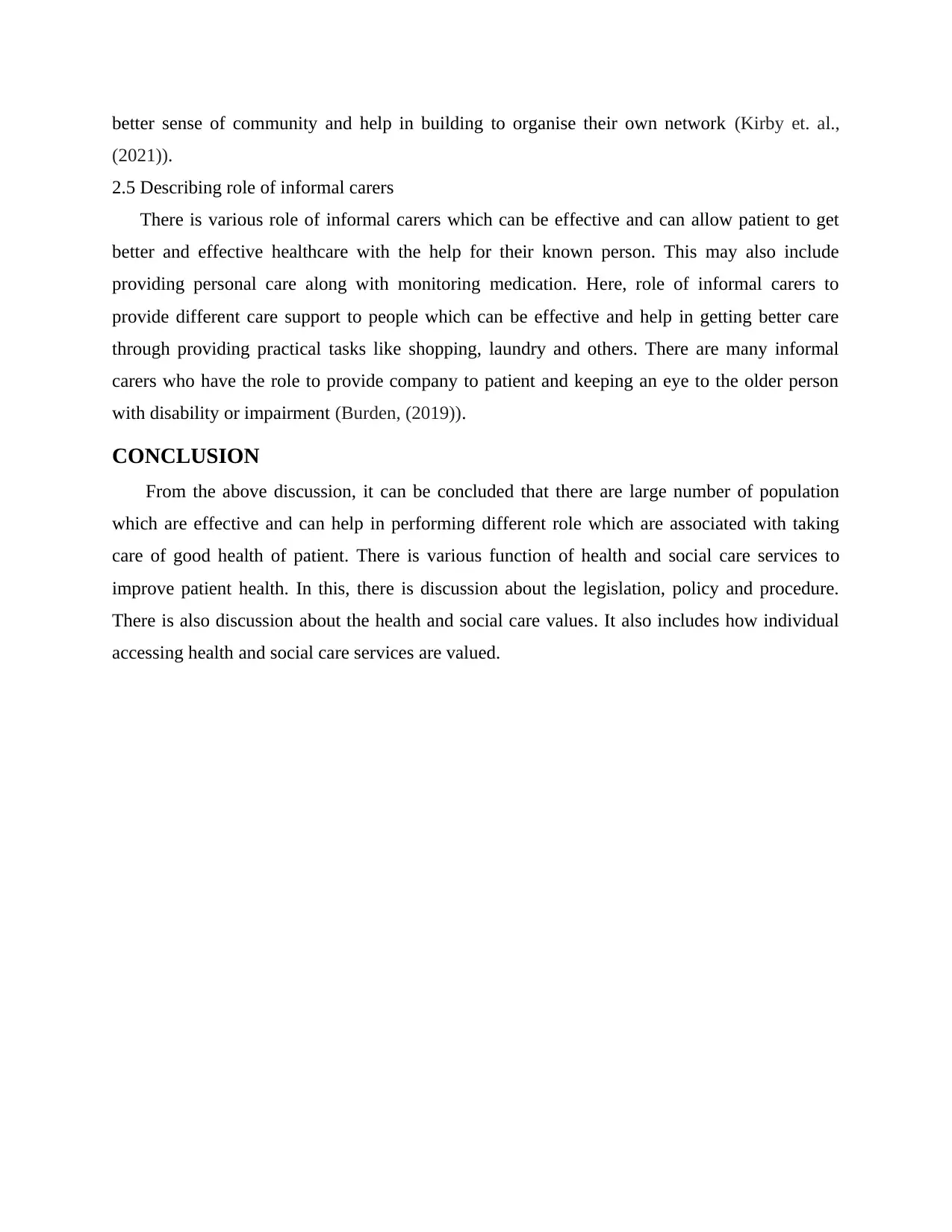
better sense of community and help in building to organise their own network (Kirby et. al.,
(2021)).
2.5 Describing role of informal carers
There is various role of informal carers which can be effective and can allow patient to get
better and effective healthcare with the help for their known person. This may also include
providing personal care along with monitoring medication. Here, role of informal carers to
provide different care support to people which can be effective and help in getting better care
through providing practical tasks like shopping, laundry and others. There are many informal
carers who have the role to provide company to patient and keeping an eye to the older person
with disability or impairment (Burden, (2019)).
CONCLUSION
From the above discussion, it can be concluded that there are large number of population
which are effective and can help in performing different role which are associated with taking
care of good health of patient. There is various function of health and social care services to
improve patient health. In this, there is discussion about the legislation, policy and procedure.
There is also discussion about the health and social care values. It also includes how individual
accessing health and social care services are valued.
(2021)).
2.5 Describing role of informal carers
There is various role of informal carers which can be effective and can allow patient to get
better and effective healthcare with the help for their known person. This may also include
providing personal care along with monitoring medication. Here, role of informal carers to
provide different care support to people which can be effective and help in getting better care
through providing practical tasks like shopping, laundry and others. There are many informal
carers who have the role to provide company to patient and keeping an eye to the older person
with disability or impairment (Burden, (2019)).
CONCLUSION
From the above discussion, it can be concluded that there are large number of population
which are effective and can help in performing different role which are associated with taking
care of good health of patient. There is various function of health and social care services to
improve patient health. In this, there is discussion about the legislation, policy and procedure.
There is also discussion about the health and social care values. It also includes how individual
accessing health and social care services are valued.
Paraphrase This Document
Need a fresh take? Get an instant paraphrase of this document with our AI Paraphraser
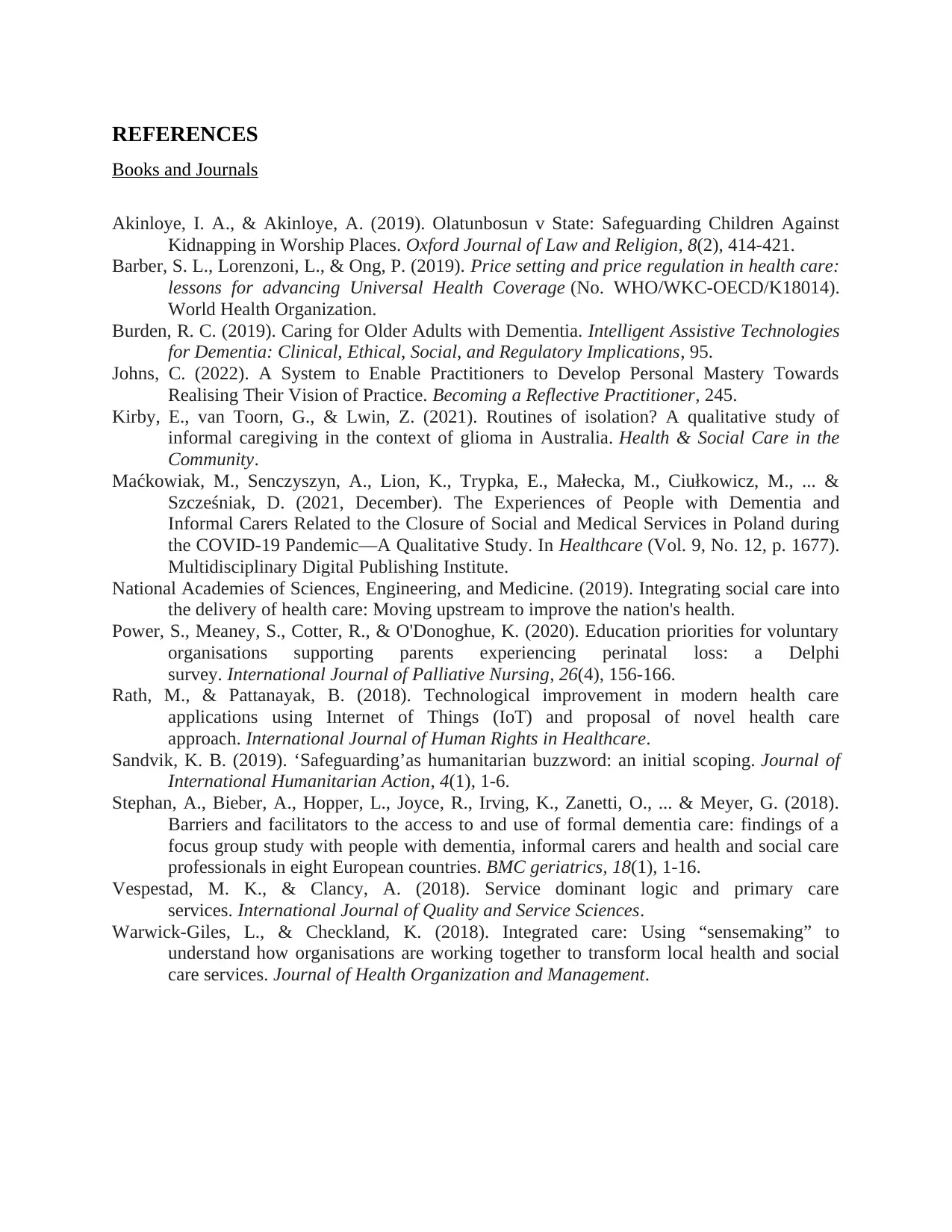
REFERENCES
Books and Journals
Akinloye, I. A., & Akinloye, A. (2019). Olatunbosun v State: Safeguarding Children Against
Kidnapping in Worship Places. Oxford Journal of Law and Religion, 8(2), 414-421.
Barber, S. L., Lorenzoni, L., & Ong, P. (2019). Price setting and price regulation in health care:
lessons for advancing Universal Health Coverage (No. WHO/WKC-OECD/K18014).
World Health Organization.
Burden, R. C. (2019). Caring for Older Adults with Dementia. Intelligent Assistive Technologies
for Dementia: Clinical, Ethical, Social, and Regulatory Implications, 95.
Johns, C. (2022). A System to Enable Practitioners to Develop Personal Mastery Towards
Realising Their Vision of Practice. Becoming a Reflective Practitioner, 245.
Kirby, E., van Toorn, G., & Lwin, Z. (2021). Routines of isolation? A qualitative study of
informal caregiving in the context of glioma in Australia. Health & Social Care in the
Community.
Maćkowiak, M., Senczyszyn, A., Lion, K., Trypka, E., Małecka, M., Ciułkowicz, M., ... &
Szcześniak, D. (2021, December). The Experiences of People with Dementia and
Informal Carers Related to the Closure of Social and Medical Services in Poland during
the COVID-19 Pandemic—A Qualitative Study. In Healthcare (Vol. 9, No. 12, p. 1677).
Multidisciplinary Digital Publishing Institute.
National Academies of Sciences, Engineering, and Medicine. (2019). Integrating social care into
the delivery of health care: Moving upstream to improve the nation's health.
Power, S., Meaney, S., Cotter, R., & O'Donoghue, K. (2020). Education priorities for voluntary
organisations supporting parents experiencing perinatal loss: a Delphi
survey. International Journal of Palliative Nursing, 26(4), 156-166.
Rath, M., & Pattanayak, B. (2018). Technological improvement in modern health care
applications using Internet of Things (IoT) and proposal of novel health care
approach. International Journal of Human Rights in Healthcare.
Sandvik, K. B. (2019). ‘Safeguarding’as humanitarian buzzword: an initial scoping. Journal of
International Humanitarian Action, 4(1), 1-6.
Stephan, A., Bieber, A., Hopper, L., Joyce, R., Irving, K., Zanetti, O., ... & Meyer, G. (2018).
Barriers and facilitators to the access to and use of formal dementia care: findings of a
focus group study with people with dementia, informal carers and health and social care
professionals in eight European countries. BMC geriatrics, 18(1), 1-16.
Vespestad, M. K., & Clancy, A. (2018). Service dominant logic and primary care
services. International Journal of Quality and Service Sciences.
Warwick-Giles, L., & Checkland, K. (2018). Integrated care: Using “sensemaking” to
understand how organisations are working together to transform local health and social
care services. Journal of Health Organization and Management.
Books and Journals
Akinloye, I. A., & Akinloye, A. (2019). Olatunbosun v State: Safeguarding Children Against
Kidnapping in Worship Places. Oxford Journal of Law and Religion, 8(2), 414-421.
Barber, S. L., Lorenzoni, L., & Ong, P. (2019). Price setting and price regulation in health care:
lessons for advancing Universal Health Coverage (No. WHO/WKC-OECD/K18014).
World Health Organization.
Burden, R. C. (2019). Caring for Older Adults with Dementia. Intelligent Assistive Technologies
for Dementia: Clinical, Ethical, Social, and Regulatory Implications, 95.
Johns, C. (2022). A System to Enable Practitioners to Develop Personal Mastery Towards
Realising Their Vision of Practice. Becoming a Reflective Practitioner, 245.
Kirby, E., van Toorn, G., & Lwin, Z. (2021). Routines of isolation? A qualitative study of
informal caregiving in the context of glioma in Australia. Health & Social Care in the
Community.
Maćkowiak, M., Senczyszyn, A., Lion, K., Trypka, E., Małecka, M., Ciułkowicz, M., ... &
Szcześniak, D. (2021, December). The Experiences of People with Dementia and
Informal Carers Related to the Closure of Social and Medical Services in Poland during
the COVID-19 Pandemic—A Qualitative Study. In Healthcare (Vol. 9, No. 12, p. 1677).
Multidisciplinary Digital Publishing Institute.
National Academies of Sciences, Engineering, and Medicine. (2019). Integrating social care into
the delivery of health care: Moving upstream to improve the nation's health.
Power, S., Meaney, S., Cotter, R., & O'Donoghue, K. (2020). Education priorities for voluntary
organisations supporting parents experiencing perinatal loss: a Delphi
survey. International Journal of Palliative Nursing, 26(4), 156-166.
Rath, M., & Pattanayak, B. (2018). Technological improvement in modern health care
applications using Internet of Things (IoT) and proposal of novel health care
approach. International Journal of Human Rights in Healthcare.
Sandvik, K. B. (2019). ‘Safeguarding’as humanitarian buzzword: an initial scoping. Journal of
International Humanitarian Action, 4(1), 1-6.
Stephan, A., Bieber, A., Hopper, L., Joyce, R., Irving, K., Zanetti, O., ... & Meyer, G. (2018).
Barriers and facilitators to the access to and use of formal dementia care: findings of a
focus group study with people with dementia, informal carers and health and social care
professionals in eight European countries. BMC geriatrics, 18(1), 1-16.
Vespestad, M. K., & Clancy, A. (2018). Service dominant logic and primary care
services. International Journal of Quality and Service Sciences.
Warwick-Giles, L., & Checkland, K. (2018). Integrated care: Using “sensemaking” to
understand how organisations are working together to transform local health and social
care services. Journal of Health Organization and Management.
1 out of 8
Related Documents
Your All-in-One AI-Powered Toolkit for Academic Success.
+13062052269
info@desklib.com
Available 24*7 on WhatsApp / Email
![[object Object]](/_next/static/media/star-bottom.7253800d.svg)
Unlock your academic potential
© 2024 | Zucol Services PVT LTD | All rights reserved.





